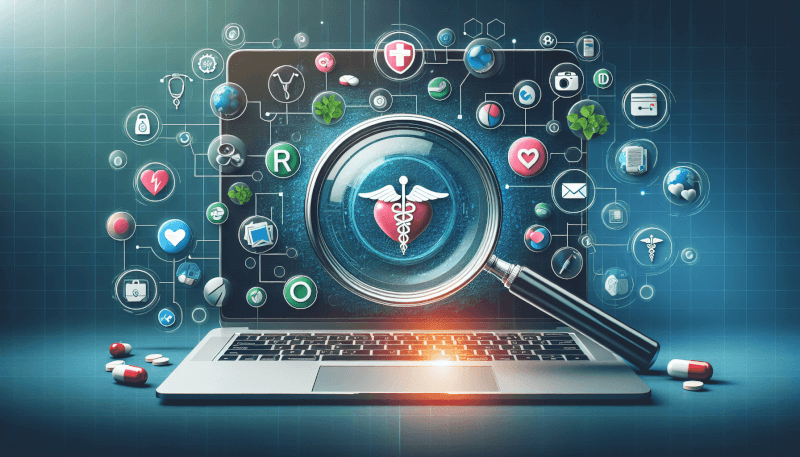In the fast-paced world of healthcare, staying ahead of the game is crucial. That’s where digital healthcare marketing comes in. With the use of innovative strategies and cutting-edge technology, it’s never been easier to reach, engage, and empower patients. From social media campaigns that educate and inspire, to personalized apps that track and monitor health, digital healthcare marketing is revolutionizing the way healthcare providers connect with their audience. So, whether you’re a doctor, a hospital administrator, or a pharmaceutical company, it’s time to embrace the power of digital marketing and take your healthcare services to new heights.

What is Digital Healthcare Marketing?
Definition
Digital healthcare marketing refers to the use of digital channels and strategies to promote healthcare products, services, and organizations to targeted audiences. It involves leveraging various digital platforms such as websites, search engines, social media, email, and online advertising to reach and engage with healthcare professionals, patients, and consumers.
Importance
Digital healthcare marketing is essential in today’s technology-driven world. It allows healthcare organizations to connect with their target audiences in a more efficient, cost-effective, and measurable way. By utilizing digital strategies, healthcare providers can increase brand awareness, drive patient engagement, improve patient outcomes, and ultimately, grow their business.
Benefits
The benefits of digital healthcare marketing are numerous. Firstly, it provides a wider reach compared to traditional marketing methods. With billions of people using the internet and social media platforms, healthcare organizations can expand their reach and target specific demographics more effectively.
Digital marketing also allows for improved targeting and personalization. Through data-driven insights and analytics, healthcare marketers can tailor their messages and content to specific audiences, increasing the likelihood of engagement and conversion.
Moreover, digital healthcare marketing provides the opportunity for real-time interaction and feedback. Patients and consumers can engage directly with healthcare providers through social media platforms, websites, and email marketing. This not only fosters a sense of trust and transparency but also enables healthcare organizations to address concerns, provide support, and build lasting relationships with their audiences.
Key Strategies for Digital Healthcare Marketing
Content Marketing
Content marketing is a fundamental strategy for digital healthcare marketing. It involves creating and distributing valuable and relevant content to attract, educate, and engage with the target audience. This content can take the form of blog posts, articles, videos, infographics, and more.
By producing high-quality content that addresses the needs and interests of healthcare professionals, patients, and consumers, healthcare organizations can position themselves as thought leaders and trusted sources of information. Content marketing also helps improve search engine rankings, drive organic traffic to websites, and nurture relationships with potential leads.
Search Engine Optimization (SEO)
Search Engine Optimization (SEO) is crucial for digital healthcare marketing as it helps healthcare websites rank higher in search engine results pages (SERPs). SEO involves optimizing website content, structure, and technical elements to improve visibility and organic traffic.
Healthcare organizations can optimize their websites by conducting keyword research and incorporating relevant keywords in their content and meta tags. They can also focus on improving page loading speed, enhancing user experience, and obtaining quality backlinks from reputable sources. By implementing effective SEO strategies, healthcare providers can increase their online visibility, attract more visitors, and ultimately generate more leads.
Social Media Marketing
Social media marketing is a powerful tool for digital healthcare marketing. It allows healthcare organizations to connect directly with their target audience and build relationships through platforms such as Facebook, Instagram, Twitter, and LinkedIn.
By creating engaging and informative social media posts, healthcare providers can raise brand awareness, share educational content, and engage with their followers. Social media platforms also provide opportunities for paid advertising and targeting specific demographics based on interests, location, and other relevant factors.
Email Marketing
Email marketing remains an effective strategy in digital healthcare marketing. By building an email list of interested healthcare professionals, patients, and consumers, healthcare organizations can send targeted and personalized messages directly to their inbox.
Email marketing can be used to share educational content, promote new services or products, and nurture leads by sending regular newsletters or providing exclusive offers. With the use of marketing automation tools, healthcare providers can segment their email lists and send automated messages based on specific triggers and actions taken by the recipients.
Pay-per-Click Advertising
Pay-per-click (PPC) advertising allows healthcare organizations to display ads on search engines and other digital platforms and pay only when a user clicks on the ad. PPC campaigns can be highly targeted and cost-effective, as healthcare providers can choose specific keywords, demographics, and locations to reach their desired audience.
PPC advertising is particularly effective in promoting specific services, attracting new patients, and driving traffic to landing pages or conversion forms. By monitoring and optimizing their campaigns, healthcare organizations can maximize their return on investment and generate high-quality leads.
Trends in Digital Healthcare Marketing
Artificial Intelligence (AI) in Healthcare Marketing
Artificial Intelligence (AI) is revolutionizing the healthcare industry, and its impact on digital marketing is no exception. AI-powered tools can analyze vast amounts of data, predict user behavior, and personalize marketing efforts based on individual preferences.
In healthcare marketing, AI can help optimize content, deliver personalized recommendations, and enhance customer service through chatbots or virtual assistants. By harnessing the power of AI, healthcare organizations can improve patient engagement, provide more accurate targeting and segmentation, and deliver a more personalized and efficient marketing experience.
Video Marketing
Video marketing is a rapidly growing trend in digital healthcare marketing. With the rise of platforms such as YouTube and TikTok, video content has become highly popular among healthcare professionals, patients, and consumers.
Healthcare organizations can create video content to educate, entertain, and engage their audience. This can include tutorials, interviews with experts, patient testimonials, or behind-the-scenes footage. Video marketing helps humanize the brand, increase audience engagement, and capture attention in a visually-driven online landscape.
Voice Search Optimization
With the increasing popularity of voice-activated personal assistants such as Siri, Alexa, and Google Assistant, voice search optimization has become a crucial aspect of digital marketing.
Healthcare organizations should optimize their websites and content to accommodate voice queries. This can be done by incorporating natural language, focusing on long-tail keywords, and providing concise answers to frequently asked questions. By embracing voice search optimization, healthcare providers can ensure their content is accessible and visible to users through voice-activated devices.
Mobile Marketing
Mobile marketing has become essential in digital healthcare marketing due to the widespread use of smartphones and tablets. Healthcare organizations need to ensure their websites are mobile-friendly, with responsive design and fast loading times.
Mobile apps can also play a significant role in healthcare marketing. By developing user-friendly and secure mobile apps, healthcare providers can offer personalized experiences, appointment scheduling, medication reminders, and access to electronic health records. Mobile marketing allows healthcare organizations to be present in the daily lives of their patients and consumers, enhancing engagement and improving patient outcomes.
Targeting Specific Audiences in Digital Healthcare Marketing
Healthcare Professionals
Digital healthcare marketing can effectively target healthcare professionals such as doctors, nurses, and pharmacists. These professionals have unique needs and interests, and by providing valuable and relevant content, healthcare organizations can establish themselves as trusted sources of information.
For example, a healthcare organization can develop a blog specifically catered to healthcare professionals, offering insights, case studies, and the latest research in their field. By leveraging social media platforms and connecting with professional networks, healthcare providers can engage in discussions and share knowledge with their target audience.
Patients and Consumers
Digital healthcare marketing can also focus on reaching and engaging with patients and consumers. This involves tailoring marketing messages, content, and campaigns to address specific patient needs, conditions, and preferences.
For instance, a healthcare provider specializing in diabetes care can offer educational resources, lifestyle tips, and interactive tools through their website and social media platforms. By understanding the concerns and challenges of their target patients, healthcare organizations can develop content and campaigns that resonate with their audience, ultimately helping them make informed decisions about their healthcare.

Compliance and Regulatory Considerations for Digital Healthcare Marketing
HIPAA Compliance
Health Insurance Portability and Accountability Act (HIPAA) compliance is of utmost importance in digital healthcare marketing. HIPAA regulations ensure the privacy and security of patients’ personal health information (PHI) when it is collected, stored, and transmitted electronically.
Healthcare organizations must adhere to HIPAA guidelines by implementing technical safeguards, conducting thorough risk assessments, and maintaining appropriate audit trails. This ensures that patients’ PHI is protected and that any marketing efforts strictly adhere to HIPAA regulations.
FDA Regulations
When promoting pharmaceutical products and medical devices, healthcare organizations must also comply with regulations set forth by the U.S. Food and Drug Administration (FDA). The FDA regulates the marketing and advertising of prescription drugs, over-the-counter medications, and medical devices to ensure they are safe, effective, and accurately represented to the public.
Healthcare marketers must obtain appropriate approvals and adhere to labeling and promotional requirements when advertising regulated products. This includes providing accurate information, mentioning potential risks and side effects, and avoiding misleading or deceptive claims.
Measuring Success in Digital Healthcare Marketing
Key Performance Indicators (KPIs)
Measuring the success of digital healthcare marketing efforts is essential to determine the effectiveness of strategies and allocate resources appropriately. Key Performance Indicators (KPIs) help assess performance and track progress towards marketing goals.
Common KPIs for digital healthcare marketing include website traffic, conversion rates, click-through rates, social media engagement, email open rates, and return on investment (ROI) for paid advertising campaigns. By regularly monitoring and analyzing these metrics, healthcare organizations can identify areas for improvement and optimize their marketing strategies accordingly.
Analytics and Reporting
Utilizing analytics tools is crucial for gathering data and insights into audience behavior, campaign performance, and overall marketing success. Tools such as Google Analytics provide valuable information about website traffic, user demographics, referral sources, and user engagement.
By analyzing data and generating comprehensive reports, healthcare organizations can make data-driven decisions, identify trends, and refine their marketing strategies. Regular reporting also helps communicate the impact of digital healthcare marketing efforts to stakeholders within the organization.
Challenges and Solutions in Digital Healthcare Marketing
Privacy and Security
One of the major challenges in digital healthcare marketing is ensuring privacy and security throughout the entire marketing process. Healthcare organizations must prioritize protecting patients’ confidential information and comply with strict privacy regulations.
Solutions to this challenge include adopting secure data storage methods, utilizing encryption technology, and implementing robust cybersecurity measures. By investing in secure systems and training employees on privacy protocols, healthcare organizations can minimize the risk of data breaches and build trust with their audience.
Competition
The healthcare industry is highly competitive, and healthcare providers must find ways to stand out from the crowd. With the increasing digital landscape, competition in the digital healthcare marketing space has become even more fierce.
To overcome this challenge, healthcare organizations can focus on creating unique and valuable content, delivering exceptional customer experiences, and leveraging data and analytics to identify gaps in the market. By understanding their target audience and positioning themselves as trusted experts in their field, healthcare providers can differentiate themselves from competitors and attract and retain loyal customers.
Resource Constraints
Limited resources, including budget and manpower, can be a significant challenge for healthcare organizations when implementing digital marketing strategies.
To address this issue, healthcare providers can prioritize their marketing efforts by focusing on the most impactful strategies and channels. They can leverage automation tools to streamline processes, optimize budget allocation, and outsource certain tasks to digital marketing agencies or freelancers. By effectively managing resources and investing in high-impact initiatives, healthcare organizations can achieve their marketing goals within their limitations.
Case Studies in Digital Healthcare Marketing
Successful Digital Healthcare Marketing Campaigns
Several healthcare organizations have successfully implemented digital healthcare marketing campaigns to achieve their marketing goals. For example, a major pharmaceutical company launched an educational content campaign targeting healthcare professionals, providing in-depth case studies, expert insights, and informative articles on a dedicated website. This campaign not only increased brand awareness but also positioned the company as a trusted thought leader in the industry.
Another case study involves a healthcare system that implemented a patient-focused social media campaign to promote preventive care and raise awareness about specific health conditions. By sharing engaging videos, graphics, and personal stories, they successfully engaged with their target audience, resulting in increased patient appointments and improved health outcomes.
Future of Digital Healthcare Marketing
Emerging Technologies
The future of digital healthcare marketing lies in the advancements of emerging technologies. Technologies such as Virtual Reality (VR), Augmented Reality (AR), and wearable devices are already impacting the healthcare industry and will continue to shape the digital marketing landscape.
Using VR and AR, healthcare organizations can provide immersive experiences to educate patients about medical procedures or simulate healthcare scenarios for training purposes. Wearable devices can collect and transmit patient data in real-time, allowing healthcare providers to deliver personalized marketing messages and targeted interventions.
Personalized Marketing
Personalized marketing will continue to play a pivotal role in digital healthcare marketing. By leveraging patient data, healthcare organizations can provide tailored experiences and targeted messaging to individual patients and consumers.
Through data analytics, healthcare providers can gain insights into patient preferences, behaviors, and health needs. This data can be used to create customized marketing campaigns, offer personalized recommendations, and deliver relevant content through various digital channels.
Conclusion
Digital healthcare marketing is a powerful tool for healthcare organizations to reach and engage with their target audience. By leveraging strategies such as content marketing, SEO, social media marketing, email marketing, and PPC advertising, healthcare providers can enhance brand awareness, improve patient engagement, and drive business growth.
Emerging trends such as AI in healthcare marketing, video marketing, voice search optimization, and mobile marketing are shaping the future of digital healthcare marketing and offering new opportunities for healthcare organizations to connect with their audience.
However, healthcare organizations must address compliance and regulatory considerations such as HIPAA and FDA regulations to ensure the privacy and security of patients’ personal information. Measuring success through KPIs, analytics, and reporting is crucial for continuous improvement and optimization of digital healthcare marketing efforts.
While facing challenges such as privacy and security, competition, and resource constraints, healthcare organizations can overcome these obstacles by prioritizing privacy and security, differentiating themselves from competitors, and effectively managing resources.
By learning from successful case studies and embracing emerging technologies, healthcare providers can stay ahead of the curve and deliver personalized marketing experiences that resonate with their audience. The future of digital healthcare marketing is bright, offering immense potential to enhance patient outcomes, improve healthcare delivery, and establish lasting connections with patients and consumers.

